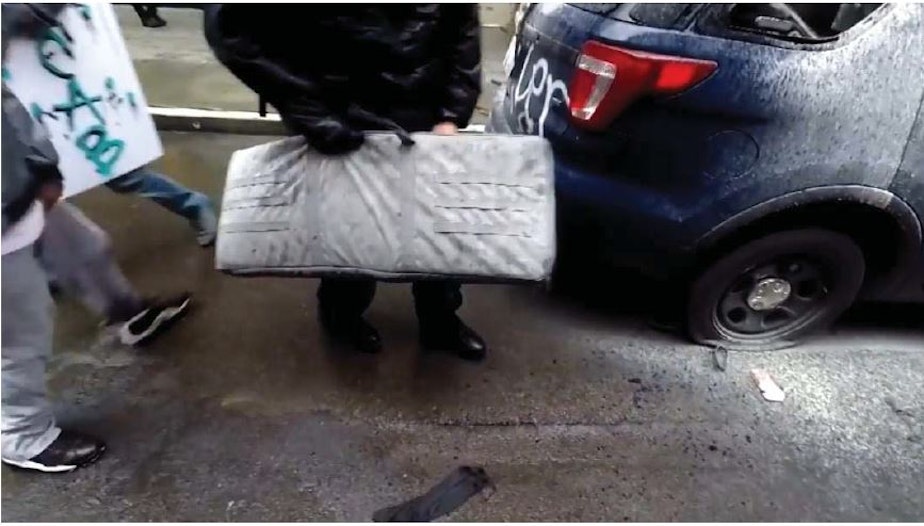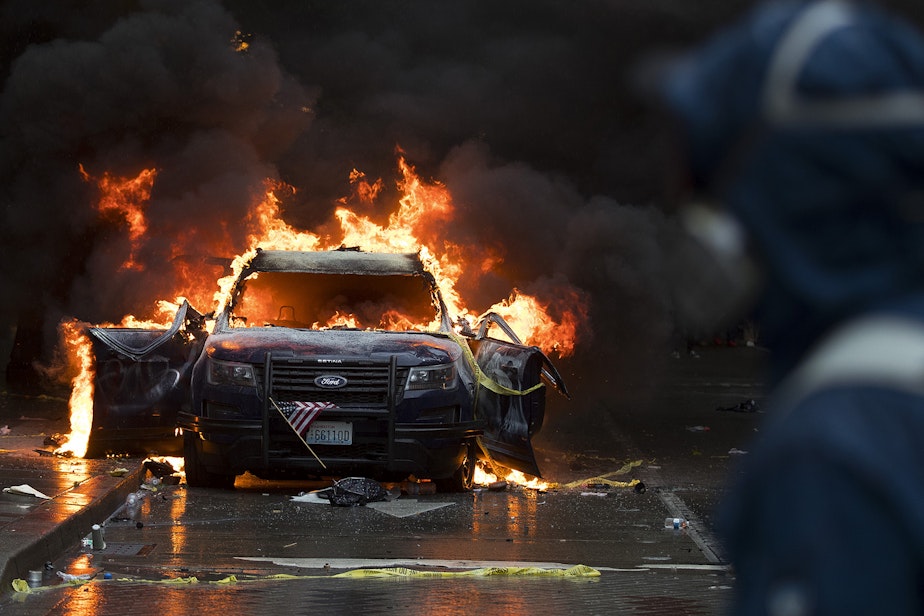Federal prosecutors take over Seattle protester cases, concerning local attorneys

This week the U.S. Attorney’s Office in Seattle announced its eighth arrest related to events during this summer’s protests against racism and police brutality.
Defense attorneys say the Justice Department is going out of its way to try to discredit the protests.
But U.S. Attorney Brian Moran said his Seattle office is focused on cases like arson or firearms violations that he says are hurting the protest message.
That includes the big protest in Seattle the night of May 30. People took guns out of police vehicles and set the cars on fire, leading to three federal cases so far.
The next night, a man was arrested after being accused of striking a police officer in the face with a can of beer, and of carrying an improvised firearm.
Stephanie Knightlinger, a senior deputy prosecutor with the King County Prosecutors Office, said she was preparing to charge that man, Devinare Parker, in King County Superior Court.
“We really worked with the Seattle police detective,” Knightlinger said. “We had to make sure he did things like test-fire the firearm, it was an unusual sawed-off homemade shotgun that [Parker] brought to this protest.”
Sponsored
But then she found out that federal prosecutors were reviewing Parker’s case.
“They simply say, look we’re interested in this case, we want to look at the firearm," she said.
Moran's office charged Parker with possession of a destructive device, and the state charges were dismissed. Parker is now in federal custody.
Moran, the U.S. attorney for western Washington, said that he’s horror-stricken at the killing of George Floyd by Minneapolis police, and that he's determined to protect First Amendment rights. But he said some acts committed during the Seattle protests are taking away from those conversations.
"It’s destructive to that important conversation that we in Seattle have had going on since Jenny Durkan was U.S. attorney with the consent decree. So, lots of emotions,” he said. “And unfortunately what I’m spending most of my time on now is the criminal agitators and not the more important message of, what do we need to do to get this ship righted.”
Sponsored

So far, the federal cases from Moran’s office have focused on charges related to arson, Molotov cocktails and firearms -- Moran said the Bureau of Alcohol, Tobacco and Firearms has expertise to contribute in those cases.
He said in arson cases typically police from Seattle, Bellevue or elsewhere “may work with the ATF and say ‘this is an arson case, that’s really your sweet spot,’ so ATF will probably pick that case up and run with it.”
Moran said he hopes the federal charges act as a deterrent to others. “I’ve been told, probably anecdotally, that once we charged our first arson case, that the number of protesters or criminal agitators carrying Molotov cocktails dropped substantially,” he said.
Sponsored
Moran said Seattle’s handful of protest-related cases is a stark contrast to Portland where federal prosecutors have filed dozens. (And one of the Seattle cases involves charging a man in Seattle with making a threat to bomb a Portland police station).
But Moran said each U.S. Attorney has been independent, and he’s had had no pressure from Attorney General William Barr or anyone else.
“I’ve been asked this a few times, ‘Are you getting directions from main Justice and the White House about who to charge, and how many to charge?’ and the answer is ‘absolutely not,’” he said.
But public defenders say these arson and vandalism cases are not typical for federal court. Dennis Carroll is an assistant federal public defender in Seattle. He said these cases don’t require complex investigations, and they don’t involve federal property. He sees them as politically motivated.
Sponsored
“We think bringing these cases to federal court is an effort by the Department of Justice to mischaracterize these protests and make them seem more violent and damaging than they actually are,” Carroll said.
One of the people Carroll represents is Isaiah Willoughby. Willoughby is charged with arson and accused of setting a fire outside the Seattle Police Department’s East Precinct while it was abandoned in July.
“This is a uniquely local matter that should be handled in state court,” Carroll said. “However, the Department of Justice came in, and took the cases to federal court where they can levy draconian mandatory minimum penalties against the people who are charged.”
If convicted in federal court, Willoughby faces a mandatory minimum of five years in prison. Carroll said Willoughby would have faced 12 to 18 months in state court.
Sponsored
Willoughby, Parker and some of the others facing federal charges remain in custody at the Federal Detention Center in SeaTac. Carroll said life is particularly anxious for his clients there because that facility recently had an outbreak of Covid-19.
“The ones who are stuck in detention at the Federal Detention Center are facing conditions of confinement that are difficult” especially now, he said. “It’s also dangerous because the risk of infection inside an institution like the Federal Detention Center is pretty high. And they don’t know when their case will be going to trial.”
Carroll and Moran say the U.S. District Court in Seattle is looking to resume criminal trials in October at the earliest.




